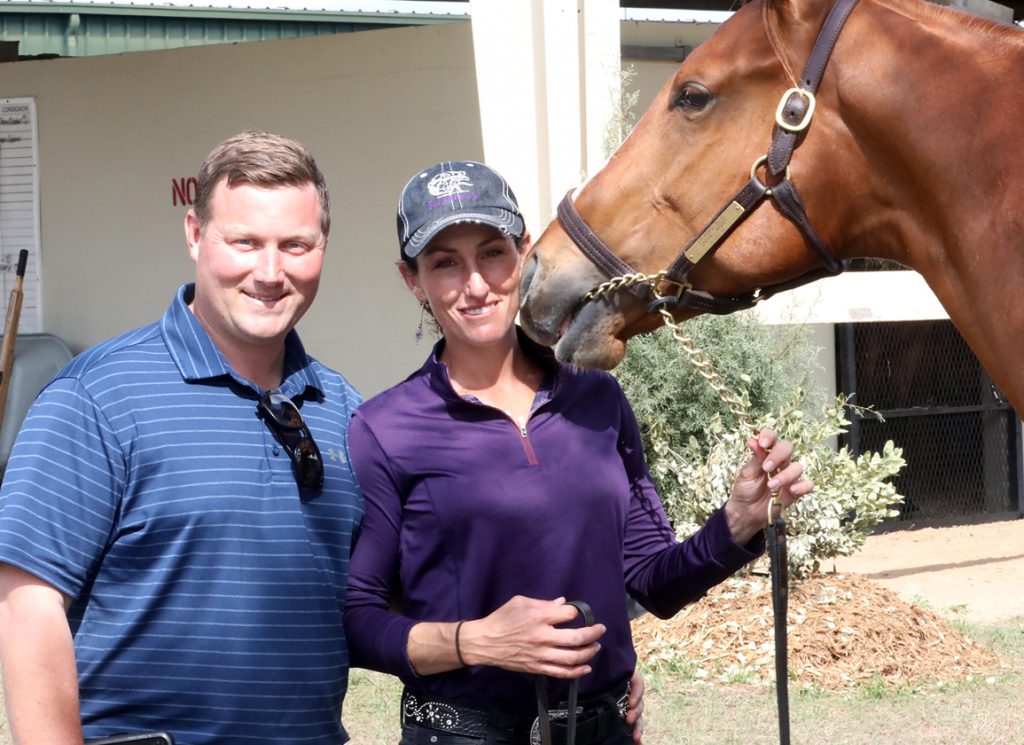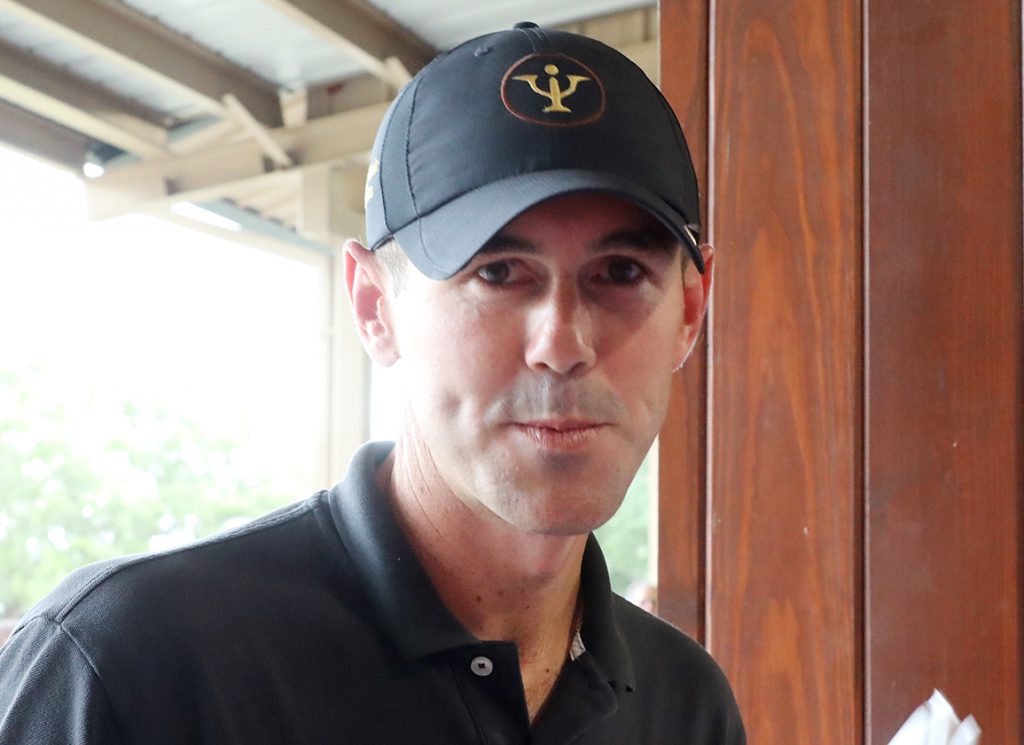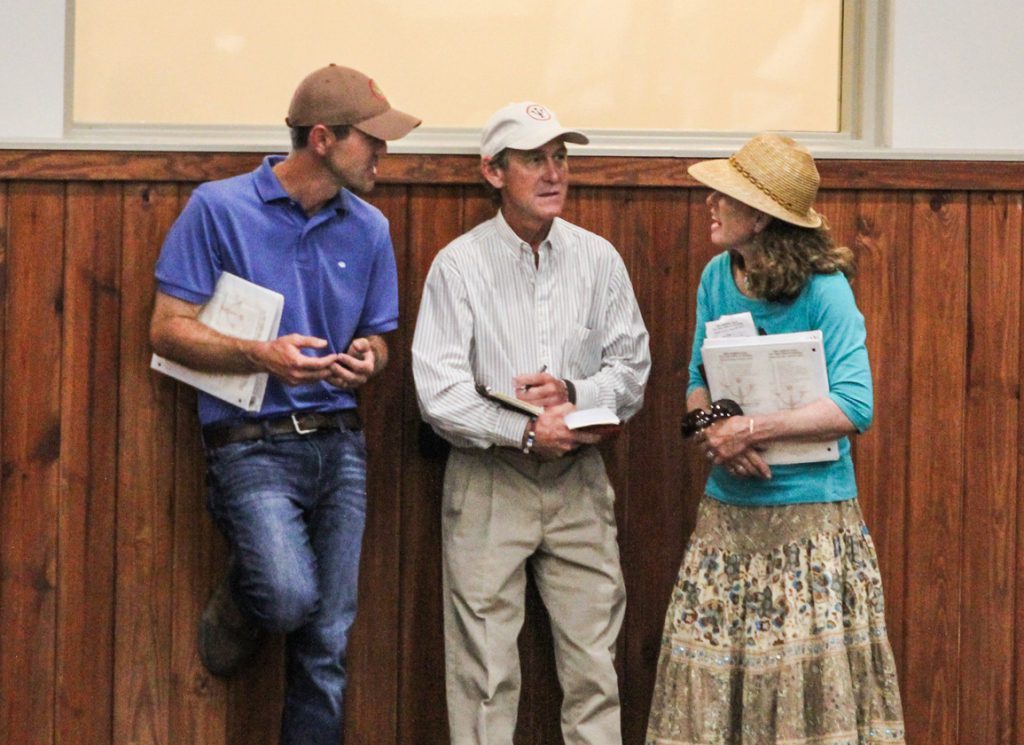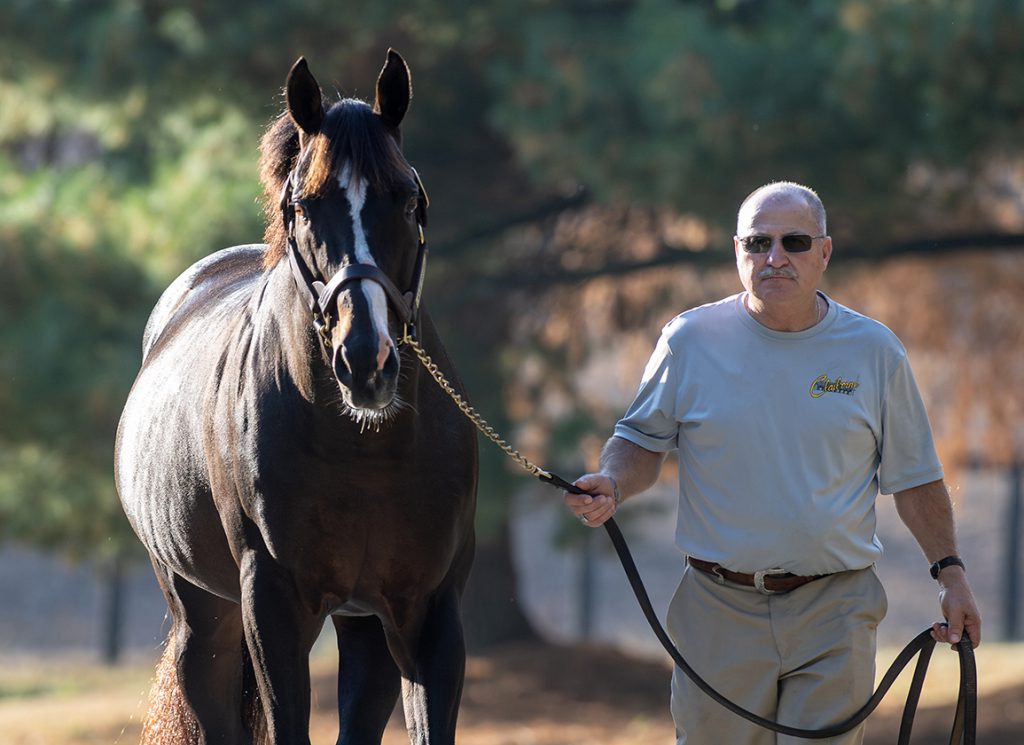They say that life is what happens to us when we're busy making other plans. But even in a game where so much turns on chance, for better or worse, you can't just throw your hands up and leave it all to fate. After all, the countervailing dynamic to life on a horse farm is unchangingly cyclical: foaling, mating, breaking, prepping, to everything there is a season. Within those patterns, sure, we know to expect much unpredictability. But that's how horses teach us the long game, to be patient and wait until you can see the whole picture.
Few in our community knows all this better than Craig Bandoroff. His whole life has turned on fleeting episodes of good and bad luck, from the terrible spill that ended his career as a jockey to the serendipitous encounters at university-with a professor from another program, for instance, who reconciled him to a changed relationship with horses; and, above all, with his future wife-that ultimately adapted his gifts to the foundation of Denali Stud. At the same time, Bandoroff and his wife Holly have had many years to think about and plan for the transfer of responsibility for the business they built from scratch to their son Conrad.
As has quickly become apparent in this series, there's seldom a formal and specific moment of transition. But for the past couple of years Bandoroff has progressively backed into semi-retirement, with the combined benefit of expert counsel and his own reflection.
“I think the one thing I've learned in the process is that there's a reason a lot of successions don't work out,” he says. “And the reason is…because it's really hard to do! You need the right balance on both sides. The father has to be of the right mindset. And the son or daughter a) has to be capable; and b) has to be given the time to come into the position and become ready to take over. It's like a relay race. When you're starting out, the successor is the one waiting in the block. And eventually you get there and hand on the baton, and first they're one step away, then they're 10 steps away, and then they're gone.”
In the meantime, however, there's that critical moment when you might easily drop the baton and, to avoid that, for a few strides you both have to be flat out and in step.
“Exactly,” agrees Bandoroff. “Now we did hire a family consultant, to help us through it, and that was invaluable. But at the end of the day you have to do it your way because everybody's different, and every successor is different. So you just figure out the balance. But there are some real caveats. Really everybody says the same thing: at some point you have to give up the control, you can't hover over them. And the ones that don't make it are the fathers that didn't get out of the way, that just wouldn't vacate.”
Bandoroff didn't really have that problem, in that he was positively eager to gear down.
“What happened with me I've learned to be very common,” he says. “You just hit a wall. I was doing it all myself, there are a lot of moving parts, and you just reach the point where you say, 'Man, I'm not 40 anymore, I just can't keep going at the same pace.'”
Again, they were lucky in that Conrad had long manifested both desire and eligibility to take the legacy forward. Neither of those, of course, are ever guaranteed. Neither of Conrad's sisters had ever evinced any interest, instead discovering vocations that put the horse business in due perspective. One, for instance, is nursing at the prestigious Cincinnati Children's Hospital.
“Like I say: we sell horses, she saves lives,” Bandoroff says proudly. “And the other daughter works in government policy for an investment bank, really keeping track of the political stream. We joke that the girls obviously got the brains. But they didn't get the horse gene, and Conrad definitely did.”
And what if he hadn't?
“I guess then you just sell, you take the money and move on,” Bandoroff says with a shrug. “And, in all honesty, that's pretty much what I always expected to happen. But at a pretty early age Conrad showed that this was the direction he wanted to go. And after urging, pleading, begging him to do something else, once we made the commitment to him, it was, 'Okay, if you want to do this, then let's see if you can jump through all the hoops.”
Over the years Bandoroff has seen plenty of people fail to meet this kind of challenge, and he put corresponding groundwork into the succession.
“I took it on with a sense that I had to do this right,” he says. “I was dealing with something that took Holly and me 30-plus years to build. That's a lot of sweat equity. And I'm dealing with my son. So we set out on a plan to give him the tools we thought he'd need to be successful. And he embraced everything we ever suggested.”
Both father and son acknowledge a huge debt to the Godolphin Flying Start program, which broadened Conrad's horizons so generously. Even those raised to the best standards at home can only benefit from seeing how other horsemen, in other environments, meet the universal challenges of the Thoroughbred. And Bandoroff, for his own part, not only consulted esteemed peers to borrow lessons learned in parallel situations; he even took a course at Harvard that included a module on succession and family business.
“Thirty years might not be nearly as long as some, but it's still a long time, especially when you've started from ground zero,” he says. “I think if you make the judgment that the successor is not capable, then you need a Plan B. But in our case I saw very clearly that the successor had all the tools. That doesn't mean it's easy. And of course you can think that, and then it doesn't happen. But in this case I feel it's happening. I see it.”
So how about those moments, in the transition, when there were the inevitable disagreements? You've renounced control, but this could be some question of strategy vital to the future of a business that involves everybody in the clan.
“Honestly, or maybe remarkably, Conrad and I have had very few lock-horn moments,” Bandoroff says. “But, yes, that's where you say to yourself, 'Look, I can't screw this up. Because if I do, not only am I screwing up the business that we built, but I'm screwing up my family.' I was never one to sit there and say, 'Oh gosh, look what I did and how wonderful it is.' But you want to keep this thing going. Which is harder: to build the business, or to keep it up there? And the answer is that both are hard. No question, whether it's Conrad or Walker Hancock or Bret Jones, they definitely had a big head start-but it's still really hard.”
The privileges of succession certainly come with commensurate burdens. The clients who lose their favorite mare, for instance: that call is now Conrad's to make.
“Yes it is!” Bandoroff exclaims with relief. “After a storm last year, we had a real bad call that had to be made. And I just sat there and said to myself, 'Well, I'm glad I don't have to pick up that phone.' I still have clients I'm closely involved with. But I've told Conrad, 'Look, you have to be the rainmaker now. I never enjoyed that part of it and I'm not going to do it anymore.' And he gets that. But that's where the pressure comes.
“Every once in a while there'll be something where you say to yourself, 'Hey, this is going to be a bumpy landing.' There was one time I could see from a distance it probably wasn't going to end well. But I made some big mistakes along the way, that cost me a lot, and I know that you don't forget those. The good news is that you're only ever a phone call away. There's going to be a day, hopefully quite a few years from now, where you're not. But at this stage I think we just try not to let the boat drift too far off course at any point. You're never going to let it crash, obviously. But in the end it's going to be harder for them to learn from mistakes, if you're not going to let them make any.”
All that said, when your life and your work have so long been conflated, you can't just sever yourself from decades of routine overnight. Bandoroff still starts every day with TDN, albeit nowadays a winter sanctuary in Bald Head Island, N.C., is embraced with a clearer conscience.
“At first, this word 'retirement' is out there like some panacea or some oasis in the desert,” he says. “And then you get there and, well, there's lots that's great, but you also realize how some of the stuff you're leaving behind is really important to you, too. So what makes handing off nice is that I had the opportunity to say, 'Look, I still do want to be involved in certain things and not in others.' I get to do what I want to do, when I want to do it; or what I have to do, when I have to do it. The good part is when the 'have to' is over, I go back to the 'want to' and that's the whole key. But as opposed to a CEO who retires from some company and it's over, I was able to do it on my terms. And that's working out great. That's still being able to go into the ring and buy a mare that could down the line maybe become a foundation type for us.”
Certainly Bandoroff is at pains to keep looking forward, and not to dwell on his own past, remarkable as it has been.
“Look, I think everybody knows the story about how my arm was paralyzed,” he says. “And yeah, there were a couple of years after that happened, it was a tough road and a long one. And thank God I had family to support me and help me get through it. And then by happenstance, at the University of Virginia I met this couple who had a farm and hunters and went out to visit them one day. And they said, 'Oh, come on, why don't you get on a horse?' And I did. That gene had gone dormant, but they got it reignited and then it all went in a different direction. And it's a crazy thing to say, but maybe it was the best thing that ever happened to me.”
Having glimpsed a path, he came to Kentucky for direction. His first mentor here was the “awesome” Fred Seitz; and then the man who was transforming the whole business, Lee Eaton. On top of that, it was transferring to college here that had enabled him to meet Holly.
“I always said that for me it was love at first sight, it just took her a little longer to be convinced,” he says with a grin. “If you don't like Holly, you don't like human beings. She's one of those angels without wings. But once we started our own operation, she had to learn the horse business or she was going to be a very lonely woman. Because it is all-consuming: not a lifestyle, but a life. So Holly embraced that, and became integral to everything that we were able to do. I can tell you, without Holly, there wouldn't have been a Denali Stud to hand off because I would just have just pissed somebody off and that would have been the end of it!”
Apart from anything else, of course, Holly has been a priceless pivot between her husband and son during this whole process of transition; and, moreover, she never let them forget that Conrad also has sisters.
“And rightly so,” Bandoroff says. “Conrad and I spend a lot of time together, do a lot of things together, but his sisters obviously have to be part of the equation. And we're very fortunate that the accountant that set it all up did so in such a way that everybody in the family was tied to the success of Denali Stud.”
One way or another, then, that split-second of disaster at Garden State Park in 1974 ultimately opened the door to a whole new life. Bandoroff impatiently dismisses pointless retrospection. What would have happened, had he renounced horses as intended when going to the University of Virginia? Or, before that, how far might he have gone as a jockey but for what happened?
“Who knows? Who cares, right?” he says with a shrug. “People said I had talent and, looking at the pictures, I look pretty good on a horse. Doesn't matter. Look, it's a good story and it turned out good.
“I'm not going to be arrogant and say we have pulled this off, but I will say that I couldn't be happier with where we are. Conrad has grown into the role as the leader of the company in every way I could hope. That gives me a sense of pride I can't really describe.”
That was enhanced by a note Bandoroff received from one of the great achievers of the global business, remarking that Conrad had clearly inherited his values.
“It's always been really important to me to raise horses in the manner that they have a chance to go on and be good horses,” he reflects. “And I think when people think of us, they associate us with quality. We've always wanted a person to walk up to that barn and say, 'I really like this horse-and these people have sold good horses before.'”
Bandoroff feels that our walk of life makes a rather better job of succession than most others.
“The statistics tell you that in the 'real' world a large percentage fail,” he says. “I think the success rate in our cottage population is very high. I think what makes it different, for us, is the land. There's something about both the land and the horse that's a little different from inheriting machines that push out widgets.
“One of the real joys now is that we can both be at the barn and, instead of somebody coming up to me, they go up to Conrad. Maybe for some people that would hurt their feelings. But, to me, it's the greatest feeling in the world. It took a long time to get to that spot.
“Conrad started with me eight years ago, which is honestly hard to believe. In many ways, he has the baton now and he's moving farther away on his own. I feel like he and Claire are the faces of Denali Stud now. It's their company. As I look out at the ocean, that's a wonderful thing to be able to say.”
The post ‘Succession’ Presented by Neuman Equine Insurance: Craig Bandoroff, Denali Stud appeared first on TDN | Thoroughbred Daily News | Horse Racing News, Results and Video | Thoroughbred Breeding and Auctions.










